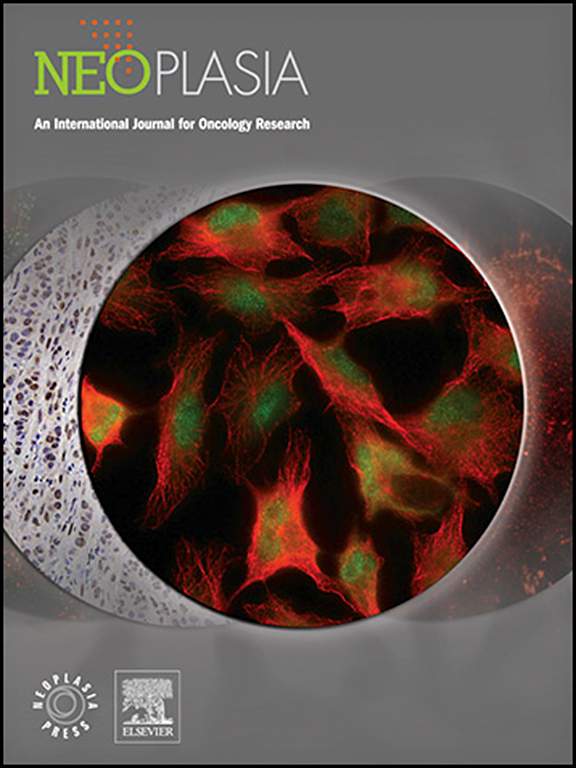肿瘤新抗原是三阴性乳腺癌小鼠模型中显著抗肿瘤免疫的关键驱动因素
IF 7.7
2区 医学
Q1 Biochemistry, Genetics and Molecular Biology
引用次数: 0
摘要
最近的研究强调了靶向肿瘤新抗原在实体瘤中的治疗潜力;然而,它对乳腺癌的疗效尚不清楚。在这里,我们评估肿瘤新抗原靶向策略在同基因小鼠乳腺癌模型中的影响。先前暴露于4T1肿瘤细胞(PETCs)或肿瘤细胞衍生裂解物(tdl)治疗的小鼠表现出强大的抗肿瘤免疫,通过肿瘤免疫微环境重塑导致肿瘤生长和转移减少。在小鼠原位肿瘤中给予TdL可显著增强免疫检查点阻断的功效,提示其可能是一种免疫治疗佐剂。为了进一步优化基于新抗原的方法,我们开发了一种基于脂质纳米颗粒(LNP)的新抗原肽递送系统,该系统有效地抑制了肿瘤在体内的进展和转移。从机制上讲,这一策略促进了抗原特异性T细胞的活化,重塑了肿瘤免疫景观,增强了免疫介导的肿瘤排斥反应。这些发现强调了个性化肿瘤新抗原靶向免疫疗法在乳腺癌中的治疗前景,并支持其在临床环境中的进一步评估。本文章由计算机程序翻译,如有差异,请以英文原文为准。
Tumor neoantigens as key drivers of significant anti - tumor immunity in triple - negative breast cancer mouse models
Recent studies have highlighted the therapeutic potential of targeting tumor neoantigens in solid tumors; however, its efficacy in breast cancer remains unclear. Here, we evaluate the impact of tumor neoantigen-targeted strategies in a syngeneic mouse mammary carcinoma model. Mice previously exposed to 4T1 tumor cells (PETCs) or treated with tumor cell-derived lysates (TdLs) exhibited robust antitumor immunity, leading to reduced tumor growth and metastasis through tumor immune microenvironment remodeling. TdL administration in mice harboring orthotopic tumors significantly enhanced the efficacy of immune checkpoint blockade, suggesting its potential as an immunotherapeutic adjuvant. To further optimize neoantigen-based approaches, we developed a lipid nanoparticle (LNP)-based delivery system for neoantigen peptides, which effectively suppressed tumor progression and metastasis in vivo. Mechanistically, this strategy promoted antigen-specific T cell activation and reshaped the tumor immune landscape, enhancing immune-mediated tumor rejection. These findings underscore the therapeutic promise of personalized tumor neoantigen-targeted immunotherapy in breast cancer and support its further evaluation in clinical settings.
求助全文
通过发布文献求助,成功后即可免费获取论文全文。
去求助
来源期刊

Neoplasia
医学-肿瘤学
CiteScore
9.20
自引率
2.10%
发文量
82
审稿时长
26 days
期刊介绍:
Neoplasia publishes the results of novel investigations in all areas of oncology research. The title Neoplasia was chosen to convey the journal’s breadth, which encompasses the traditional disciplines of cancer research as well as emerging fields and interdisciplinary investigations. Neoplasia is interested in studies describing new molecular and genetic findings relating to the neoplastic phenotype and in laboratory and clinical studies demonstrating creative applications of advances in the basic sciences to risk assessment, prognostic indications, detection, diagnosis, and treatment. In addition to regular Research Reports, Neoplasia also publishes Reviews and Meeting Reports. Neoplasia is committed to ensuring a thorough, fair, and rapid review and publication schedule to further its mission of serving both the scientific and clinical communities by disseminating important data and ideas in cancer research.
 求助内容:
求助内容: 应助结果提醒方式:
应助结果提醒方式:


